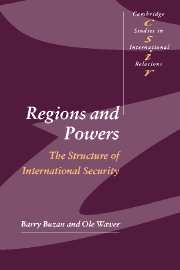Book contents
- Frontmatter
- Contents
- List of illustrations
- Preface
- List of abbreviations
- 1 Patterns of regional security during the Cold War
- 2 Patterns of regional security post-Cold War
- Part I Introduction: developing a regional approach to global security
- Part II Asia
- Part III The Middle East and Africa
- Part IV The Americas
- Part V The Europes
- Introduction
- 11 EU-Europe: the European Union and its ‘near abroad’
- 12 The Balkans and Turkey
- 13 The post-Soviet space: a regional security complex around Russia
- Conclusions: scenarios for the European supercomplex
- Part VI Conclusions
- Glossary
- References
- News media
- Index of names
- General Index
- CAMBRIDGE STUDIES IN INTERNATIONAL RELATIONS
Conclusions: scenarios for the European supercomplex
Published online by Cambridge University Press: 05 December 2009
- Frontmatter
- Contents
- List of illustrations
- Preface
- List of abbreviations
- 1 Patterns of regional security during the Cold War
- 2 Patterns of regional security post-Cold War
- Part I Introduction: developing a regional approach to global security
- Part II Asia
- Part III The Middle East and Africa
- Part IV The Americas
- Part V The Europes
- Introduction
- 11 EU-Europe: the European Union and its ‘near abroad’
- 12 The Balkans and Turkey
- 13 The post-Soviet space: a regional security complex around Russia
- Conclusions: scenarios for the European supercomplex
- Part VI Conclusions
- Glossary
- References
- News media
- Index of names
- General Index
- CAMBRIDGE STUDIES IN INTERNATIONAL RELATIONS
Summary
Europe consists of two centred RSCs, one centred on the EU, one on Russia. Both are centred on great powers. The EU-dominated one is a security community and its centredness holds high legitimacy in most of its periphery, which to a large extent tries to join the core as members. Russia in contrast dominates its area by more heavy-handed measures and its legitimacy is challenged, although at the elite level (especially in Central Asia) there is a certain voluntary participation in a Russian imperial order. The Balkans is a subcomplex in EU-Europe.
The Balkans is unlikely to change dramatically. More wars might be in store (e.g., in Montenegro, in Macedonia, in or around Albania), and the Balkans will remain a conflictual subcomplex within Europe. It is not likely that the EU can disengage and leave the Balkans as a separate RSC (though the USA is more likely to be able to do so). Nor will conflicts be overcome and political and economic transformations executed with such efficiency that the Balkans soon blends into European normality and stops being distinct.
For the whole European supercomplex, there are three primary questions.
In the EU-dominated RSC, it is the general question of European integration. One can imagine a spectrum from the EU cohering further internally and becoming a much more efficient global actor, to something like the current contradictory status quo, or elements of disintegration. Complete fragmentation and renationalisation cannot be ruled out, but are increasingly unlikely. Thus, the complex basically stays centred, a security community, and a great power of (increasing) global relevance. This means continued avoidance of mutual state-to-state securitisation and most likely updated versions of the meta-securitisation about the threat that Europe's past poses to Europe's future.
[…]
- Type
- Chapter
- Information
- Regions and PowersThe Structure of International Security, pp. 437 - 440Publisher: Cambridge University PressPrint publication year: 2003

